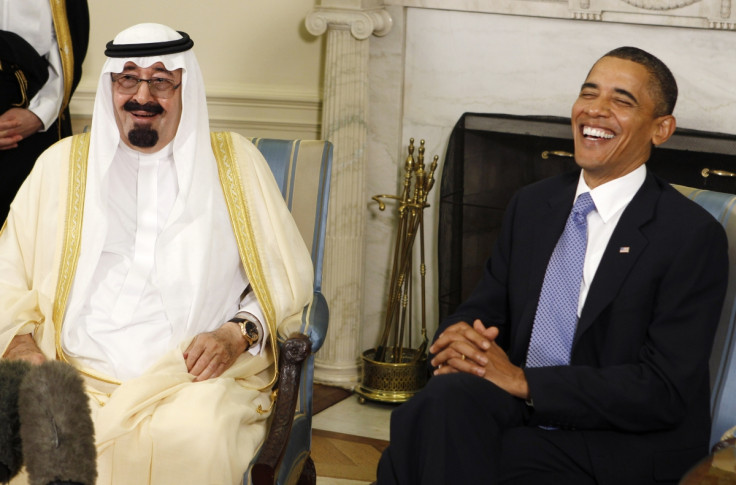What's the Saudi Beef With Barack Obama?

Barack Obama arrives in Saudi Arabia with the task of appeasing an angry ally.
Having spent the week touring European states, rallying support for Washington's sanctions offensive against Russia, Obama faces a different kind of challenge when he meets with Saudi King Abdullah.
Relations between the long-standing allies are at their lowest point since the post-9/11 years. Saudi reaction to Obama's foreign policy in the Mideast has ranged from exasperation to disbelief. While the Obama administration has been accused of flip-flopping on important Middle East issues from Syria to Egypt, US policy over the past nine months has been consistent in that it has always upset Riyadh.
What's more, the House of Saud has vented its frustrations in public. Last December, Prince Turki al-Faisal said there was "an issue of confidence" with the US President. Days later, the Saudi Ambassador to the UK wrote an op-ed piece in the New York Times, stating that American policy on Syria and Iran amounted to a "dangerous gamble" that "risk the security and stability of the Middle East." High criticism indeed. But when did it all start to go wrong?
Since Mohamed Morsi was ousted as the Egyptian President in July, the US and Saudi geopolitical goals for the region have diverged. The Gulf monarchy was relieved to see Egypt's first democratically elected leader fall. Riyadh sees the Muslim Brotherhood, to which Morsi belongs, as an existential threat and the Saudis threw political and economic support behind the forces that ousted him.
Egyptian regime change was greeted with caution in the United States. No great fan of the Brothers themselves, but eager to show support for the democratic process in Egypt, Washington reacted by postponing military aid to the country.
As the military consolidates its power in Egypt, and former army chief Abdel-Fattah al-Sissi times his run for the presidency, the US military deal remains off the table. But Washington's refusal to embrace the new status quo in Egypt is just the first in a line of foreign policy issues that have infuriated the Saudis.
The Syrian crisis has been a source of more contention between the two allies. Saudi Arabia has backed rebel forces since the uprising began in 2011 and has been working with Washington on providing light arms and training to selected fighters for around year.
However the countries' aims have split on this vital issue as well. In short, Riyadh wants to see the Assad regime fall and to be replaced with a government that it could deal with. They see an opportunity to wrestle influence in Syria away from Iran, which has backed the Assad dynasty for decades.
Reports last August that the Syrian government had indiscriminately used chemical weapons against civilians in Damascus spurred Western leaders into action. Belligerent rhetoric in Washington, London and Paris looked set to precede a military intervention against Assad. The Saudis thought the tide was turning in their favour.
The Americans looked set to take military action against Damascus, only to pull back at the eleventh hour. Riyadh was infuriated.
The third and most significant tension between the allies has been Washington's pursuit of a nuclear deal with Iran. Under its former President Mahmoud Ahamdinejad, Saudi Arabia's regional adversary Iran, had become a pariah state. Frozen out of the global economy by tough US-led sanctions, Iran was backed in to a corner.
However following the election of a moderate President, Hassan Rouhani, Iran has managed to engender good will among Western leaders. The warming relations between Washington and Tehran could end with a deal later in the year, which would probably see Iran giving concessions on its nuclear programme in return for a lifting of international sanctions. Saudi Arabia finds itself in the peculiar position of standing alongside Israel in its condemnation of rapprochement with Iran.
While the public parts of the visit will no doubt be all smiles and cordiality, Riyadh will seize the opportunity to air its grievances behind closed doors. Top of that list is Iran. The Saudis want Obama to make clear his administration's position on Tehran's growing regional influence.
There's no doubt that Syria will be next on the agenda. As the conflict limps into its fourth year, President Assad's forces have made gains throughout the middle of the country. With the rebels on the retreat, Riyadh will again push Washington to provide more advanced weapons such as manpads, shoulder-mounted missile-launchers that could challenge the Syrian air force's dominance of the skies.
King Abdullah will also try to shift Washington's position on Egypt. Sissi's election as President this year looks more like a formality every day and Saudi Arabia is keen that a future Sissi administration not be hampered by American sanctions.
If there's any time left, Obama and Abdullah may discuss the Israeli-Palestinian peace talks but the long running conflict isn't the most pressing issue for either leader right now.
© Copyright IBTimes 2025. All rights reserved.






















